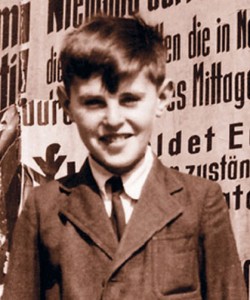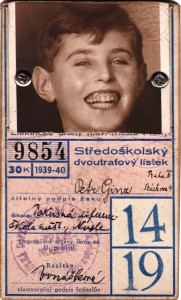Fri, 01/30/2015 - 5:49pm
Reading the published diary of someone who died early can be a poignant experience. You can only speculate on what they might have become had they lived. Sometimes all you can think is, "The world lost this person too soon."
 Petr Ginz (1928-1944) was a child of extraordinary energy and gifts: between the ages of 8 and 14 he wrote five novels. He was also an accomplished painter (for a child) and a fluent speaker of Esperanto with an insatiable curiosity about science. Given his privileged background (his father was a Prague textile exporter) in normal times he would have a future of unlimited promise.
Petr Ginz (1928-1944) was a child of extraordinary energy and gifts: between the ages of 8 and 14 he wrote five novels. He was also an accomplished painter (for a child) and a fluent speaker of Esperanto with an insatiable curiosity about science. Given his privileged background (his father was a Prague textile exporter) in normal times he would have a future of unlimited promise.
But when he was 11 the Germans occupied Czechoslovakia and under Nazi law he was classified as ein Mischling ersten Grades, a child of mixed Aryan and Jewish ancestry: one of the racial "undesirables." In 1941 he began keeping a diary documenting life as a Jew under Nazi rule.
His writing is hauntingly laconic, sometimes wry and detached, creating a narrative vacuum that the reader's feelings and imagination automatically fill as they grasp the dark realities Ginz describes: "October 30 1941: In the morning at the Levituses. They have everything ready for the journey to Poland." And "In the morning I was with Eva [his sister] and Daddy in Maniny. It is now almost the only place where Jews can go for a walk."
At the same time the life and mind of a child often break through this catalogue of clipped details: he recounts feuds with schoolfriends ("I have organized a boycott of Popper"), gloats at getting good grades ("I had an oral test in geography and I got an A as pure as milk"), and makes cryptic references to behavior that could be the result of boyish rambunctiousness, a temper tantrum, or an outburst of despair: "In the evening I broke a lamp by throwing a pillow." As the diary continues to its end, you can feel the deepening darkness as more and more people he knows are sent to concentration camps in entries such as "July 27 1942. Auntie has left."
In October 1942 Ginz himself was sent to the Terezin camp. Being the boy he was, he continued pursuing his education and artistic pursuits. He had access to a library of confiscated books. He became an editor of the magazine started by camp residents and he wrote an Esperanto-Czech dictionary as well as another novel (lost).
In 1944 he was sent to Auschwitz, where he was killed.
In 2007 his sister Eva edited his diaries and some of his Terezin writings, which were published in English as The Dairy of Petr Ginz, 1941-1942. Ginz is also the subject of the 2012 documentary, The Last Flight of Petr Ginz.


Add new comment